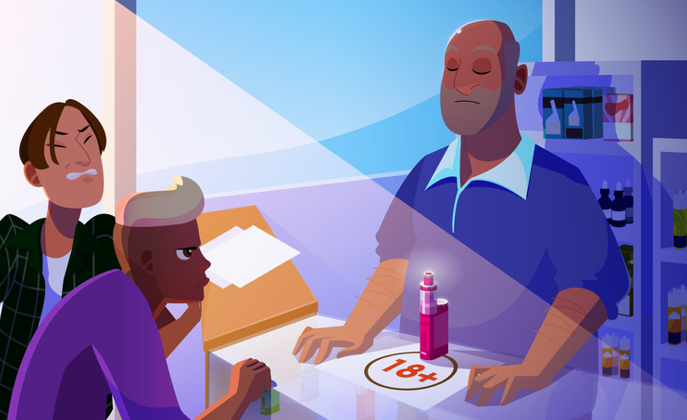Refusing Sales
A pharmacy is within its rights to refuse to serve a customer if they do not wish to. This may be an obvious example such as the customer is aggressive, threatening or under the influence of alcohol or drugs. It is your responsibility to discuss this with the pharmacist and familiarise yourself with any actions you should take. All sales should be supervised by the pharmacist and are at their discretion. However the above list is not exclusive and a common occurrence in community pharmacy is the fact that you may suspect that a customer is potentially abusing medicines purchased through the volume or number of visits they make to your pharmacy, Some common medicines both General Sales List and Pharmacy Only that are frequently misused / abused and require extra scrutinisation include:
- Codeine-based medicines
Ask a pharmacist which OTC medicine is most vulnerable to abuse, and chances are they will say codeine. The high awareness of codeine misuse means pharmacists are vigilant for unusual sales. A request for three bottles of co-codamol is likely to raise flags in any pharmacy but users don’t always go for the products with the highest dose of codeine. Technically, they could buy a bottle of co-codamol together with Nurofen Plus for the maximum hit or request smaller quantities from several pharmacies making it difficult to monitor. However once people form a habit, they “tend to stick with that specific product”. So rather than directing your concern at requests for high quantities of codeine, consider the customer who regularly asks for a relatively low-dose product by brand name e.g.,"Solpadeine".
- Cough products
Abuse of cough medicines is a particular issue where products containing medicines like Codeine and Dextromethorphan are a cause for concern. Excellent questioining techniques to be used when communicating with customers / patients such as the use of WWWHAM, ASMETHOD, ENCORE and SIT DOWN SIR can all assist with monitoring cough syrup supply and ensuring those that need it get it and those that may not are challenged.
WWHAM
- W Who is the patient
- W What are the symptoms
- H How long have the symptoms been present
- A Action taken
- M Medication being taken
ASMETHOD
- A Age/appearance
- S Self or someone else
- M Medication
- E Extra medicines
- T Time persisting
- H History
- O Other symptoms
- D Danger symptoms
ENCORE
- E Explore
- N No medication
- C Care
- O Observe
- R Refer
- E Explain
SIT DOWN SIR
- S Site or location of a sign/symptom
- I Intensity or severity
- T Type or nature
- D Duration
- O Onset
- W With (other symptoms)
- N Annoyed or aggravated by
- S Spread or radiation
- I Incidence or frequency
- R Relieved by
- Sedative antihistamines
The sedative properties of many antihistamines are well-known. In fact, several are not even marketed for their anti-allergy properties and are now sold as sleeping aids, "Nytol" as an example. Their potential for abuse is clear. Patients are most likely to start taking the products because they are having trouble sleeping, and then find themselves unable to stop. Regular use is likely to lead to higher and higher doses being taken as their tolerance goes up and the tablets stop having an effect, so the patient needs to take more and more for the same effect.
- Decongestants
Pharmacists are already alert to the abuse of pseudoephedrine and ephedrine, which are subject to strict controls because they can be misused. Some people experience a buzz from using the product on its own which can lead to addiction, but the products can be used in the manufacture of other illegal drugs. Monitoring people who regularly buy even small amounts of the products is a good start because again they could be purchasing from several locations. Good communication and raising concerns between pharmacies can all help because, again, to ensure those that need it get it and those that may not are challenged.
- Laxatives
Although they do not cause addiction, laxatives can nonetheless be abused. Desperation to lose weight can result in people taking products such as senna on a regular basis. This can be a sign of mental health problems and can also pose physical problems in the long term. In long term use and or high doses, laxatives can cause obvious conditions such as chronic diarrhoea and also less well-known problems such as an electrolyte imbalance and even a lazy bowel.
Age restricted sales - As well as potential misuse products there are also products and certain items that the pharmacy will stock which have age restrictions. In particular razor blades, knifes, sharp scissors or some foot care products such as corn knives which are not permitted to be sold to an individual under 18 in the UK. Also, solvent based glues, aerosols and nail varnish remover and glue for artificial nails must not be supplied to those under 18 if you know or believe that they are likely to inhale the substance to achieve intoxication or otherwise abuse the product.
All employees making the sale must be confident the customer is over 18, otherwise the business or individual could be liable for a £5,000 fine and up to 6 months in prison. There are different approaches a pharmacy can take to ensure they stay legal, such as applying a 'challenge 25' policy which is ensuring anyone who looks younger than 25 is asked for ID or operating a 'no ID/no sale' policy. To minimise any customer conflict, it is useful to display any restrictions at the point of sale or clearly on walls and keep a staff refusal record book to demonstrate due diligence and identify any reoccurrences or patterns within the business.
Whereas the supply of prescription medicines within a pharmacy is highly regulated, there are no legal age restrictions for buying OTC medicines such as paracetamol or decongestants although professional guidance exists. Your pharmacy will have specific policies that restrict the sale of OTC medicines to children. These may involve making decisions based on if the product is suitable for the child to use, for example some heartburn remedies are only recommended for children aged over 12 or aspirin is not suitable for those under 16.
Pharmacists have specific guidance for prescription items which they may decide to use for OTC sales.
Counterfeit banknotes - the Bank of England states that counterfeit bank notes are quite rare now, but a business must remain vigilant and check bank notes are genuine. A counterfeit note is worthless, but it is a criminal offence to hold onto or pass on counterfeit notes. Should a note be suspected as being counterfeit it should be passed to the police immediately and if the note is found to be genuine the pharmacy will be reimbursed accordingly. Should a customer wish to pay with Scottish or Northern Ireland banknotes in  England or Wales they can be accepted as they are authorised and approved by the UK parliament as legal currency. Some businesses may choose not to accept them; very often this is simply because they are unfamiliar with the notes, but although they do not have to accept them, it could mean a customer or sale is lost if you refuse to accept a payment with these notes. A pharmacy could accept payment in a foreign currency, such as Euros which may be an advantage if based near an airport or ferry port, however it would be important to keep up to date with exchange rates to ensure the customer is charged the correct price.
England or Wales they can be accepted as they are authorised and approved by the UK parliament as legal currency. Some businesses may choose not to accept them; very often this is simply because they are unfamiliar with the notes, but although they do not have to accept them, it could mean a customer or sale is lost if you refuse to accept a payment with these notes. A pharmacy could accept payment in a foreign currency, such as Euros which may be an advantage if based near an airport or ferry port, however it would be important to keep up to date with exchange rates to ensure the customer is charged the correct price.
Vouchers - Your pharmacy may accept vouchers from customers for certain products or services. It is at the pharmacy's discretion as to what can be accepted, but all vouchers should be checked for their validity, which may involve ensuring they are original vouchers, have valid dates, are for the correct product or service, and not torn or defaced as this may invalidate them. A possible voucher a customer may bring into a pharmacy are 'Healthy Start' vouchers, a UK wide government scheme allowing those who are pregnant or with children under 4 and claiming benefits to purchase milk, fruit and vegetables or more commonly in a pharmacy infant formula or vitamins. A pharmacy must be registered to claim back payment for Healthy Start vouchers before starting to accept them from customers, and only used for the relevant products.


